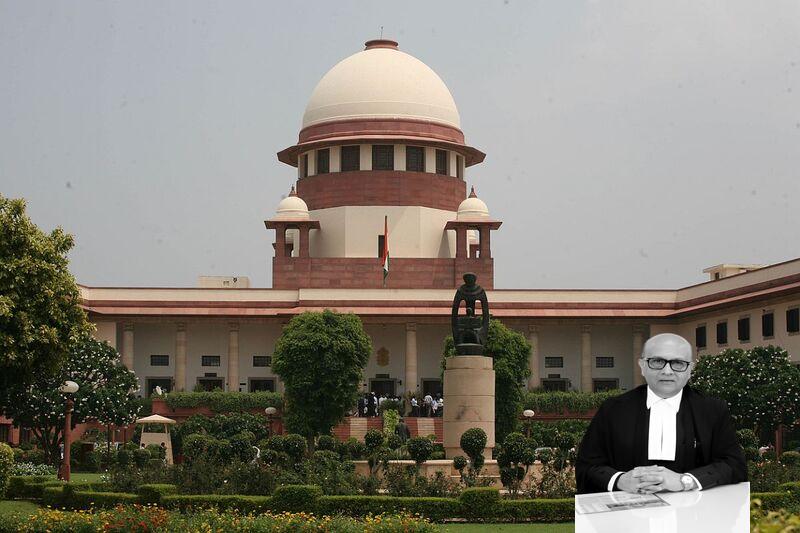On his death, the first respondent along with other heirs of the deceased filed a claim petition under the 1923 Act for compensation by claiming, inter alia, that on the date of his death, the deceased was aged 25 years and getting monthly wages of Rs. The Commissioner found that the relationship of workman-employer between the deceased and the non-claimant was admitted to the non-claimant; the deceased died in an accident in the course of his employment; and the deceased being a “Railway Servant”, as per the provisions of Section 2(34) of the Railways Act, 1989 (in short, the 1989 Act), would be deemed to be a “workman” under Section 2(1)(n)(i) of the 1923 Act and, therefore, the claim petition was maintainable. Aggrieved by the order of the Commissioner, the appellant filed a first appeal bearing number 112 of 2016 before the High Court under Section 30 of the 1923 Act. Therefore, as, by virtue of Section 3 of the 1957 Act, the deceased was part of the Armed Forces of the Union, he was not a workman within the meaning of Section 2 (1)(n) of the 1923 Act and, in view thereof, the claim petition was not maintainable under the 1923 Act.
According to the counsel for the appellant, unless an employee falls in any of the entries specified in Schedule II of the 1923 Act he cannot be considered a workman. (Note: This decision was relied upon to canvass that compensation could be had under Section 124-A of the 1989 Act and, therefore, there was no justification to invoke the provisions of the 1923 Act) SUBMISSIONS ON BEHALF OF RESPONDENTS 12. Therefore, by virtue of Section 2(1)(n)(i) of the 1923 Act read with Section 2(34) of the 1989 Act, a constable of RPF would be deemed a workman for the purposes of the 1923 Act. It was urged that by declaring a member of the RPF as a member of the armed forces of the Union, the legislative intent was not to exclude the applicability of the 1923 Act, inasmuch as Section 19 of the 1957 Act, which was simultaneously amended, though excludes the applicability of certain other Acts such as Payment of Wages Act, 1936, Industrial Disputes Act, 1947 and Factories Act, 1948, does not exclude the applicability of the 1923 Act.
Yet, despite having declared RPF as an armed force of the Union and a member of the RPF being included in the definition of a “railway servant”, with effect from 1.7.2004, the newly inserted clause (dd), defining an “employee”, takes no exception to it. In support of her submissions learned counsel for the respondents cited a number of decisions, broadly on two general principles, namely, (a) that harmonious construction of the provisions of a statute must be adopted so that no provision of a statute is rendered otiose; and (b) that the 1923 Act being a piece of social welfare legislation, its provisions must be liberally interpreted in a manner that they serve the interest of those for whose benefit it was enacted. The relevant provisions, interplay of which would have to be examined, are found in the following statutes: (i) The Workmen’s Compensation Act, 1923 (Now known as Employee’s Compensation Act, 1923) (in short, “the 1923 Act). 18.01.2010, which is relevant to the controversy at hand, reads as under: “(n) “workman” means any person who is— (i) a railway servant as defined in clause (34) of section 2 of the Railways Act, 1989 (24 of 1989), not permanently employed in any administrative, district or sub- divisional officer of a railway and not employed in any such capacity as is specified in Schedule II, or (ia) (a) a master, seaman or other member of the crew of a ship, (b) a captain or other member of the crew of an aircraft, (c) a person recruited as driver, helper, mechanic, cleaner or in any other capacity in connection with a motor vehicle, (d) a person recruited for work abroad by a company, and who is employed outside India in any such capacity as is specified in Schedule II and the ship, aircraft or motor vehicle, or company, as the case may be, is registered in India, or (ii) employed in any such capacity as is specified in Schedule II, whether the contract of employment was made before or after the passing of this Act and whether such contract is expressed or implied, oral or in writing; but does
Consequent to the change in nomenclature of the Act, clause (n) of sub-section (1) of Section 2 was omitted and clause (dd), defining an employee, was inserted in sub-section (1) of Section 2 of the 1923 Act. Clause (dd) of sub-section (1) of Section 2 of the 1923 Act reads as under: – “(dd) “employee” means a person, who is— (i) a railway servant as defined in clause (34) of section 2 of the Railways Act, 1989 (24 of 1989), not permanently employed in any administrative district or sub- divisional office of a railway and not employed in any such capacity as is specified in Schedule II; or (ii) (a) a master, seaman or other member of the crew of a ship, (b) a captain or other member of the crew of an aircraft, (c) a person recruited as driver, helper, mechanic, cleaner or in any other capacity in connection with a motor vehicle, (d) a person recruited for work abroad by a company, and who is employed outside India in any such capacity as is specified in Schedule II and the ship, aircraft or motor vehicle, or company, as the case may be, is registered in India; or (iii) employed in any such capacity as is specified in Schedule II, whether the contract of employment was made before or after the passing of this Act and whether such contract is expressed or implied, oral or in writing These entries in Schedule II, as it stood prior to the amendment brought about by Act No.45 of 2009, along with the opening part of Schedule II are extracted below: Schedule II List of Persons who, subject to the provisions of Section 2 (1) (n), are included in the definition of Workmen. “The following persons are workmen within the meaning of Section 2 (1) (n) and subject to the provisions of that section, that is to say, any person who is– “(i) employed otherwise than in a clerical capacity or on a railway, in connection with the operation, repair or maintenance of a lift or a vehicle propelled by steam or other mechanical power or by electricity or in connection with the loading or unloading of any such vehicle; or xxxxxxxxxxxxx (xii) employed upon a railway as defined in clause (31) of Section 2 and sub-section (1) of Section 197 of the Railways Act, 1890 (9 of 1890), either directly or through a sub- contractor, by a person fulfilling a contract with the railway administration; or (xiii) employed as an inspector, mail guard, sorter or van peon in the Railway Mail Service or as a telegraphist or as a postal or railway signaller, or employed in any occupation ordinarily involving outdoor work in the Indian Posts and Telegraphs Department” The relevant provisions of the 1890 Act 27. Likewise, Section 10 of the 1957 Act makes a reference to the 1890 Act, by stating that officers and members of the Force shall for all purposes be regarded as railway servants within the meaning of the 1890 Act other than Chapter VI-A thereof. Section 71C, inter alia, provided that a railway servant, other than a railway servant whose employment is essentially intermittent, shall not be deployed for more than sixty hours a week on the average in a month; whereas a railway servant whose employment is essentially intermittent shall not be deployed for more than eighty-four hours in any week. Section 2 (34) as it existed originally defined railway servant as: “railway servant means any person employed by the Central Government or by a railway administration in connection with the service of a railway.” By Act No.51 of 2003, with effect from 1.7.2004, the definition of railway servant as provided in Section 2 (34) was amended as to read: “railway servant means any person employed by the Central Government or by a railway administration in connection with the service of a railway; including member of the Railway Protection Force appointed under clause (c) of sub-section (1) of section 2 of the Railway Protection Force Act, 1957 (23 of 1957)”. Section 124 provides for the extent of liability and Section 124A, which was inserted by Act No 28 of 1994, with effect from 01.08.1994, provides for compensation on account of an untoward incident.
Saving as to certain rights.- (1) The right of any person to claim compensation under section 124 or section 124A shall not affect the right of any such person to recover compensation payable under the Workmen’s Compensation Act, 1923 (8 of 1923), or any other law for the time being in force; but no person shall be entitled to claim compensation more than once in respect of the same accident. The preamble of the Act, as originally enacted, used to read as under: “An Act to provide for the constitution and regulation of a Force called the Railway Protection Force for the better protection and security of railway property.” 41. Section 2(1)(a) defines “Force” as: “Force means the Railway Protection Force constituted under Section 3”. Section 3 of the 1957 Act has undergone a legislative change with effect from 20.09.1985 by Act No. Officers and members of the Force to be deemed to be Railway Servants.- The Inspector General and any other superior officer and every member of the Force shall for all purposes be regarded as Railway Servant within the meaning of the Indian Railway Act, 1890 other than Chapter VI-A thereof, and shall be entitled to exercise the powers conferred on Railway Servants by or under that Act.” (Emphasis supplied) 47. Post amendment, brought by Act No 60 of 1985, with effect from 20.09.1985, Section 19 of the 1957 Act reads as follows: “Section 19. The 1923 Act as it stood at the relevant time (i.e., the date of the accident out of which the claim has arisen) was an Act to provide for the payment by certain class of employers to their workman, compensation for injury by accident.
However, to maintain a claim against an “employer” under the 1923 Act, there must be, (a) a workman and an employer relationship; (b) the workman must suffer personal injury in an accident; and (c) that accident must arise out of and in the course of his employment. As per the then definition clause workman meant any one of the persons specified in sub clauses (i), (ia) and (ii) of clause (n) of sub-section (1) of Section 2 of the 1923 Act; but would not include any person working in the capacity of a member of the Armed Forces of the Union. But, these niceties apart, we think that Section 87 is quite valid even on the “policy and guideline” theory if one has proper regard to the context of the Act and the object and purpose sought to be achieved by Section 87 of the Act. They are small territories falling under the legislative jurisdiction of Parliament which has hardly sufficient time to look after the details of all their legislative needs and requirements. There is no dispute before us — and it has been unanimously held in all the decisions — that the power to make modifications and restrictions in a clause of this type is a very limited power, which permits only changes that the different context requires and not changes in substance. Therefore, in our view, mere declaration in Section 3 of the 1957 Act that the RPF shall be an “armed force of the Union” is not sufficient to take it out of the purview of the 1923 Act.
Therefore, since a railway servant continued to be a workman as per Section 2(1)(n)(i) of the 1923 Act, the provisions of the 1923 Act would continue to apply to a member of the RPF as he does not belong to any of those categories specified in Schedule II of the 1923 Act. Likewise, Section 19 of the 1957 Act, which was simultaneously amended vide Act No.60 of 1985, with effect from 20.09.1985, along with Section 3 of the 1957 Act, declaring RPF as an armed force of the Union, did not make any provision to exclude the applicability of the 1923 Act.



